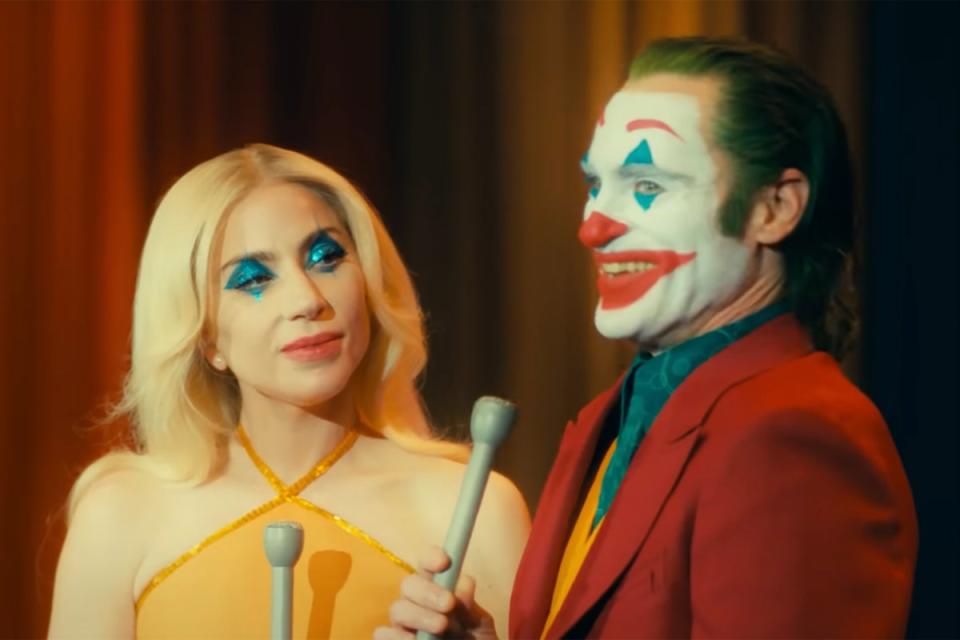Joker: Folie à Deux review – Just as bleak and daring as the original
In 2019, Todd Phillips’s revisionist DC comic book movie Joker ignited a firestorm of controversy, broke the billion-dollar mark at the global box office, and ended up winning its star Joaquin Phoenix a Best Actor Oscar. Phoenix’s Arthur Fleck, an aspiring stand-up turned psychotic killer, was an everyman antihero for our times – a stumbling loner who murders a celebrity chat show host live on air, develops an army of twisted devotees and sparks mass riots. The film was accused of glorifying violence and potentially endangering the public – Phoenix notoriously stormed out of a British newspaper interview when asked whether Joker could inspire mass shootings.
Those hysterical predictions didn’t actually come to pass, though. Today Joker is best remembered as one of the most subversive and original films of the last decade, while its hugely anticipated sequel Joker: Folie à Deux is just as bleak and formally daring as its predecessor.
Folie à Deux picks up shortly after the first film, with Arthur now locked up in Gotham City’s Arkham Asylum. He is pitiable, emaciated and heavily medicated into submission. The question of whether he is mentally fit enough to stand trial fuels the plot: ambitious district attorney Harvey Dent (Industry’s Harry Lawtey) wants him prosecuted; Arthur’s kind, solicitous and vaguely maternal lawyer Maryanne Stewart (indie stalwart Catherine Keener) believes he deserves sympathy.
Throwing a cat among the pigeons is Harleen Quinzel (Lady Gaga), a compulsive liar and pyromaniac who encounters Arthur in a music rehabilitation class, quickly gets him off his pills and urges him to tap back into his inner malice. Gaga looks as if she’s a Manson girl who’s wandered off the set of Once Upon a Time... in Hollywood, and plays Harleen with an appealingly feline cruelty.

Arthur and Harleen have a complex relationship – he falls head over heels to such an extent that they’re plunged into elaborate musical numbers whenever they’re together, the pair channelling everyone from Fred Astaire and Ginger Rogers to Sonny and Cher. Harleen, though, seems exclusively interested in her new friend’s Joker get-up, and not the damaged and vulnerable Arthur underneath it.
Phillips is clearly having fun in the director’s chair. Whereas the first film lifted visuals and story beats from the grungy nihilism of Seventies Scorsese pictures, here Phillips takes a tour through at least a century of Hollywood. Folie à Deux opens with some inspired, Looney Tunes-style animation courtesy of Oscar-nominated French filmmaker Sylvain Chomet, then becomes a Shawshank-esque prison movie, then a musical, then a courtroom drama.
Certain plot elements remain jarring. The lines between fantasy and reality aren’t always made clear, for instance. But overall Folie à Deux is just as edgy and disturbing as its forerunner, replicating the idea of modern American cities as terrifying powder kegs perpetually on the cusp of explosion.
The darkness at the core of the film is underlined by its very brutal ending, which rejects comic book conventions in favour of psychological depth. Phoenix’s performance remains powerful and stirring, too. The genius of it is that we can’t help but care for Arthur despite his neediness and derangement. Even during the film’s most apocalyptic and violent moments, we’re always aware that, underneath Joker’s gaudy warpaint, lurks little, feeble Arthur. Against the odds, this ingenious and deeply unsettling film even turns into a bit of a weepie by the final reel.
Dir: Todd Phillips. Starring: Joaquin Phoenix, Lady Gaga, Harry Lawtey, Catherine Keener, Brendan Gleeson, Zazie Beetz, Steve Coogan. 15, 138 mins.
‘Joker: Folie à Deux’ is in cinemas from 4 October

